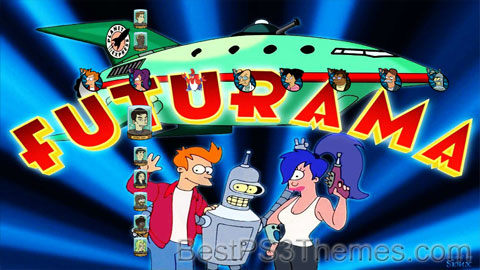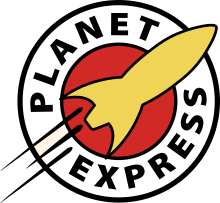Futurama theme by Lega-c
Download: Futurama_3.p3t

(7 backgrounds)
| Futurama | |
|---|---|
 | |
| Genre | |
| Created by | Matt Groening |
| Developed by |
|
| Voices of | |
| Opening theme | "Theme from Futurama" |
| Composer | Christopher Tyng |
| Country of origin | United States |
| Original language | English |
| No. of seasons | 8 |
| No. of episodes | 150 (list of episodes) |
| Production | |
| Executive producers |
|
| Producers |
|
| Editors | Paul D. Calder Danik Thomas Chris Vallance |
| Running time | 22 minutes |
| Production companies |
|
| Original release | |
| Network | Fox |
| Release | March 28, 1999 – August 10, 2003 |
| Network | Comedy Central |
| Release | March 23, 2008 – September 4, 2013 |
| Network | Hulu |
| Release | July 24, 2023 – present |
| Related | |
| The Simpsons Disenchantment | |
Futurama is an American animated science fiction sitcom created by Matt Groening for the Fox Broadcasting Company and later revived by Comedy Central, and then Hulu. The series follows the adventures of slacker Philip J. Fry, who is cryogenically preserved for 1,000 years and revived on December 31, 2999. Fry finds work at the interplanetary delivery company Planet Express, working alongside one-eyed mutant Leela and robot Bender. The series was envisioned by Groening in the mid-1990s while working on The Simpsons; he brought David X. Cohen aboard to develop storylines and characters to pitch the show to Fox.[2]
Following its initial cancellation by Fox, Futurama began airing reruns on Cartoon Network's Adult Swim programming block, which lasted from 2003 to 2007. It was revived in 2007 as four direct-to-video films, the last of which was released in early 2009. Comedy Central entered into an agreement with 20th Century Fox Television to syndicate the existing episodes and air the films as 16 new, half-hour episodes, constituting a fifth season.[3][4]
In June 2009, Comedy Central picked up the show for 26 new half-hour episodes, which began airing in 2010 and 2011.[5][6] The show was renewed for a seventh season, with the first half airing in 2012 and the second in 2013.[7][8][9] An audio-only episode featuring the original cast members was released in 2017 as an episode of The Nerdist Podcast.[10] On February 9, 2022, Hulu revived the series with a 20-episode order, which premiered on July 24, 2023.[11][12] In November 2023, the show was renewed by Hulu for two more broadcast seasons, which will air through 2026.[13][14]
Futurama received critical acclaim throughout its run and was nominated for 17 Annie Awards, winning nine of them, and 12 Emmy Awards, winning six. It was nominated four times for a Writers Guild of America Award, winning for the episodes "Godfellas" and "The Prisoner of Benda". It was nominated for a Nebula Award and received Environmental Media Awards for the episodes "The Problem with Popplers" and "The Futurama Holiday Spectacular".[15] Merchandise includes a tie-in comic book series, video games, calendars, clothes, and action figures. In 2013, TV Guide ranked Futurama one of the top 60 Greatest TV Cartoons of All Time.[16]
Premise[edit]
Characters[edit]

Futurama is essentially a workplace sitcom, the plot of which revolves around the Planet Express interplanetary delivery company and its employees,[17] a small group that largely fails to conform to future society.[18] Episodes usually feature the central trio of Fry, Leela, and Bender, though occasional storylines center on the other main characters.
- Philip J. Fry (voiced by Billy West) – Fry is an immature, slovenly, yet good-hearted and sensitive pizza delivery boy who falls into a cryogenic pod, causing it to activate and freeze him just after midnight on January 1, 2000. He reawakens on New Year's Eve of 2999 and gets a job as a cargo delivery boy at Planet Express, a company owned by his only living relative, Professor Hubert J. Farnsworth. Fry's love for Leela is a recurring theme throughout the series.
- Turanga Leela (voiced by Katey Sagal) – Leela is the competent, one-eyed captain of the Planet Express Ship.[17] Abandoned as a baby, she grows up in the Cookieville Minimum Security Orphanarium believing herself to be an alien from another planet, but learns that she is actually a mutant from the sewers in the episode "Leela's Homeworld".[19] Prior to becoming the ship's captain, Leela works as a career assignment officer at the cryogenics lab where she first meets Fry. She is Fry's primary love interest and eventually becomes his wife. Her name is a reference to the Turangalîla-Symphonie by Olivier Messiaen.[20]
- Bender Bending Rodriguez (voiced by John DiMaggio) – Bender is a foul-mouthed, heavy-drinking, cigar-smoking, kleptomaniacal, misanthropic, egocentric, ill-tempered robot manufactured by Mom's Friendly Robot Company. He is originally programmed to bend girders for suicide booths, and is later designated as assistant sales manager and cook at Planet Express, despite lacking a sense of taste. He is Fry's best friend and roommate. He must drink heavily to power his fuel cells and becomes the robot equivalent of drunk when low on alcohol.[21]
- Professor Hubert J. Farnsworth (voiced by Billy West) – Professor Farnsworth, also known simply as "the Professor", is Fry's distant nephew, and technically descendant.[22] Farnsworth founds Planet Express Inc. to fund his work as a mad scientist. Although he is depicted as a brilliant scientist and inventor, at more than 160 years old he is extremely prone to age-related forgetfulness and fits of temper. In the episode "A Clone of My Own", the Professor clones himself to produce a successor, Cubert Farnsworth (voiced by Kath Soucie), whom he treats like a son.
- Hermes Conrad (voiced by Phil LaMarr) – Hermes is the Jamaican accountant of Planet Express. A 36th-level bureaucrat (demoted to level 37 during the series) and proud of it, he is a stickler for regulation and enamored of the tedium of paperwork and bureaucracy. Hermes is also a former champion in Olympic Limbo, a sport derived from the popular party activity. He gave up limbo after the 2980 Olympics when a young fan, imitating him, broke his back and died. Hermes has a wife, LaBarbara, and a 12-year-old son, Dwight.
- Dr. John A. Zoidberg (voiced by Billy West) – Zoidberg is a Decapodian, a lobster-like alien from the planet Decapod 10, and the neurotic staff physician of Planet Express. Although he claims to be an expert on humans, his knowledge of human anatomy and physiology is woefully inaccurate (at one point, he states that his doctorate is actually in art history). Zoidberg's expertise seems to be with extra-terrestrial creatures. Homeless and penniless, he lives in the dumpster behind Planet Express. Although Zoidberg is depicted as being Professor Farnsworth's long-time friend, he is held in contempt by everyone on the crew.
- Amy Wong (voiced by Lauren Tom) – Amy is an incredibly rich, blunt, ditzy, and accident-prone yet sweet-hearted long-term intern at Planet Express. She is an astrophysics student at Mars University and heiress to the western hemisphere of Mars. In the second episode of season one, the Professor states that he likes having Amy around because she has the same bloodtype as him. Born on Mars, she is ethnically Chinese and is prone to cursing in Cantonese and using 31st-century slang. Her parents are the wealthy ranchers Leo and Inez Wong. She is promiscuous in the beginning of the series, but eventually enters a monogamous relationship with Kif Kroker. In the show's sixth season, she acquires her doctorate, and in the eighth season, she and Kif become parents.
Setting[edit]

Futurama is set in New New York at the turn of the 31st century, in a time filled with technological wonders. The city of New New York has been built over the ruins of present-day New York City, which has become a catacomb-like space that acts as New New York's sewer, referred to as "Old New York". Parts of the sewers are inhabited by mutants. Various devices and architecture are similar to the Populuxe style. Global warming, inflexible bureaucracy, and substance abuse are a few of the subjects given a 31st-century exaggeration in a world where the problems have become both more extreme and more common. Just as New York has become a more extreme version of itself in the future, other Earth locations are given the same treatment; Los Angeles, for example, is depicted as a smog-filled apocalyptic wasteland.
Numerous technological advances have been made between the present day and the 31st century. The Head Museum, which keeps a collection of heads alive in jars thanks to technology invented by Ron Popeil (who has a guest cameo in "A Big Piece of Garbage"), has resulted in many historical figures and current celebrities being present, including Groening himself; this became the writers' device to feature and poke fun at contemporary celebrities in the show. Several of the preserved heads shown are those of people who were already dead well before the advent of this technology; one of the most prominent examples of this anomaly is former U.S. president Richard Nixon, who died in 1994 and appears in numerous episodes. The Internet, while being fully immersive and encompassing all senses—even featuring its own digital world (similar to Tron or The Matrix)—is slow and largely consists of pornography, pop-up ads, and "filthy" (or Filthy Filthy) chat rooms. Some of it is edited to include educational material ostensibly for youth. Television is still a primary form of entertainment. Self-aware robots are a common sight, and are the main cause of global warming due to the exhaust from their alcohol-powered systems. The wheel is obsolete (no one but Fry even seems to recognize the design),[23] having been forgotten and replaced by hover cars and a network of large, clear pneumatic transportation tubes.
Environmentally, common animals still remain, alongside mutated, cross-bred (sometimes with humans) and extraterrestrial animals. Ironically, spotted owls are often shown to have replaced rats as common household pests. Although rats still exist, sometimes rats act like pigeons, though pigeons still exist, as well. Anchovies have been extinct for 800 years because of the Decapodians. Earth still suffers the effects of greenhouse gases, although in one episode Leela states that its effects have been counteracted by nuclear winter. In another episode, the effects of global warming have been somewhat mitigated by the dropping of a giant ice cube into the ocean, and later by pushing Earth farther away from the sun, which also extended the year by one week.
Religion is a prominent part of society, although the dominant religions have evolved. A merging of the major religious groups of the 20th century has resulted in the First Amalgamated Church,[24] while Voodoo is now mainstream. New religions include Oprahism, Robotology, and the banned religion of Star Trek fandom. Religious figures include Father Changstein-El-Gamal, the Robot Devil, Reverend Lionel Preacherbot, and passing references to the Space Pope, who appears to be a large crocodile-like creature. Several major holidays have robots associated with them, including the murderous Robot Santa and Kwanzaa-bot. While very few episodes focus exclusively on religion within the Futurama universe, they do cover a wide variety of subjects including predestination, prayer, the nature of salvation, and religious conversion.[24]
Futurama's setting is a backdrop, and the writers are not above committing continuity errors if they serve to further the gags. For example, while the pilot episode implies that the previous Planet Express crew was killed by a space wasp, the later episode "The Sting" is based on the crew having been killed by space bees instead.[25] The "world of tomorrow" setting is used to highlight and lampoon issues of today and to parody the science-fiction genre.[26]
Episodes[edit]
| Season | Episodes | Originally aired | |||
|---|---|---|---|---|---|
| First aired | Last aired | Network | |||
| 1 | 13 | March 28, 1999 | November 14, 1999 | Fox | |
| 2 | 19 | November 21, 1999 | December 3, 2000 | ||
| 3 | 22 | January 21, 2001 | December 8, 2002 | ||
| 4 | 18 | February 10, 2002 | August 10, 2003 | ||
| 5 | 16 | March 23, 2008 | August 30, 2009 | Comedy Central | |
| 6 | 26 | 13 | June 24, 2010 | November 21, 2010 | |
| 13 | June 23, 2011 | September 8, 2011 | |||
| 7 | 26 | 13 | June 20, 2012 | August 29, 2012 | |
| 13 | June 19, 2013 | September 4, 2013 | |||
| 8[27] | 20 | 10 | July 24, 2023 | September 25, 2023 | Hulu |
| 10 | July 29, 2024[27] | TBA | |||
Production[edit]
Development[edit]

The television network Fox expressed a strong desire in the mid-1990s for Matt Groening to create a new series after the success of his previous series, The Simpsons, and began conceiving Futurama during this period. In 1995, he enlisted David X. Cohen, then a writer and producer for The Simpsons, to assist in developing the show. The two spent time researching science fiction books, television shows, and films. When they pitched the series to Fox in April 1998, Groening and Cohen had composed many characters and story lines; Groening claimed they had gone "overboard" in their discussions.[28] Groening described trying to get the show on the air as "by far the worst experience of my grown-up life".[29]
Fox ordered thirteen episodes. Immediately after, however, Fox feared the themes of the show were not suitable for the network and Groening and Fox executives argued over whether the network would have any creative input into the show.[28] With The Simpsons, the network has no input.[30] Fox was particularly disturbed by the concept of suicide booths, Doctor Zoidberg, and Bender's anti-social behavior.[31] Groening explains, "When they tried to give me notes on Futurama, I just said: 'No, we're going to do this just the way we did Simpsons.' And they said, 'Well, we don't do business that way anymore.' And I said, 'Oh, well, that's the only way I do business.'"[32] The episode "I, Roommate" was produced to address Fox's concerns, with the script written to their specifications.[31][33] Fox strongly disliked the episode, but after negotiations, Groening received the same independence with Futurama.[34]
The name Futurama comes from a pavilion at the 1939 New York World's Fair. Designed by Norman Bel Geddes, the Futurama pavilion depicted how he imagined the world would look in 1959.[35] Many other titles were considered for the series, including Aloha, Mars! and Doomsville, which Groening notes were "resoundly rejected, by everyone concerned with it".[36][37] It takes approximately six to nine months to produce an episode of Futurama.[38][39] The long production time results in several episodes being worked on simultaneously.[40]
Writing[edit]
The planning for each episode began with a table meeting of writers, who discussed the plot ideas as a group. The writers are given index cards with plot points that they are required to use as the center of activity in each episode. A single staff writer wrote an outline and then produced a script. Once the first draft of a script was finished, the writers and executive producers called in the actors for a table read.[41] After this script reading, the writers collaborated to rewrite the script as a group before sending it to the animation team.[42] At this point the voice recording was also started and the script was out of the writers' hands.[39]
The writing staff held three Ph.D.s, seven master's degrees, and cumulatively had more than 50 years at Harvard University. Series writer Patric M. Verrone stated, "we were easily the most overeducated cartoon writers in history".[43]
Voice actors[edit]
Futurama had eight main cast members. Billy West performed the voices of Philip J. Fry, Professor Farnsworth, Doctor Zoidberg, Zapp Brannigan, and many other incidental characters. West auditioned for "just about every part", landing the roles of the Professor and Doctor Zoidberg.[44] Although West read for Fry, his friend Charlie Schlatter was initially given the role.[44] Due to a casting change, West was called back to audition again and was given the role. West claims that the voice of Fry is deliberately modeled on his own, so as to make it difficult for another person to replicate the voice.[44] Doctor Zoidberg's voice was based on Lou Jacobi and George Jessel.[45] The character of Zapp Brannigan was originally created for and intended to be performed by Phil Hartman.[44][45] Hartman insisted on auditioning for the role, and "just nailed it" according to Groening. Due to Hartman's death, West was given the role. West states that his version of Zapp Brannigan was an imitation of Hartman and also "modeled after a couple of big dumb announcers I knew".[44][45]
Katey Sagal voiced Leela, and is the only member of the main cast to voice only one character. The role of Leela was originally assigned to Nicole Sullivan.[44] In an interview in June 2010, Sagal remarked that she did not know that another person was to originally voice Leela until many years after the show first began.[46]
John DiMaggio performed the voice of the robot
